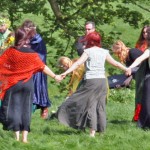Not all Pagan traditions have initiations, but some do. Not all these initiations will include all six of the features listed below. I originally wrote this article in a Wiccan context, but I would have thought it was at least applicable to other initiatory traditions.
In my view, there are six distinct aspects to initiation.
- There is the inner process of transformation;
- the initiation by the gods and goddesses (making contact with the numinous);
- experiencing the Mysteries (that which cannot be spoken, or Arrheton);
- being given the secrets of the initiating group (that which must not be spoken, or Aporrheton);
- joining the group mind of the initiating group;
- and the joining of the lineage or tradition of which the coven is part.
Some of these aspects can be conferred by self-initiation – but the group and lineage-related aspects cannot, and that is the main difference between self-initiation and group initiation. It is not that a self-initiation cannot confer genuine contact with the deities and genuine inner transformation; it is that the coven and lineage-related aspects can’t be part of self-initiation by its very definition. Similarly, if the group into which someone is initiated is not part of a lineage or tradition, then the initiation cannot confer membership of a lineage. (I would like to thank James Butler for pointing out the Arrheton and Aporrheton distinction.)
At this point it might be helpful to lay out the aspects of initiation in a table:
|
Aspect |
Self-initiation |
Group initiation |
Group initiation |
|
Inner process of transformation |
Yes |
Yes |
Yes |
|
Initiation by the gods and goddesses |
Yes |
Yes |
Yes |
|
Experiencing the mysteries – Arrheton |
Yes |
Yes |
Yes |
|
Being given secrets – Aporrheton |
No |
Yes |
Yes |
|
Joining the group mind of the coven |
No |
Yes |
Yes |
|
Joining the lineage or tradition |
No |
No |
Yes |
In the Eleusinian mysteries, Arrheton was that which could not be spoken of, and Aporrheton was that which must not be spoken of by the initiates.
All six aspects of initiation might not happen at the same time – the timing of the initiation by the gods and goddesses is up to them, and the inner process of transformation is an ongoing process, both leading up to the initiation ritual and continuing after it. After all, to initiate means to begin something.
Let’s now look at each of the six aspects in more detail.
Inner process of transformation
“Know thyself” said the inscription at Delphi, and initiation is a significant step – sometimes the first step – on a journey of self-knowledge: understanding one’s inner processes; finding out what archetypes one identifies with, but then rounding them off into real personality traits by bringing them into conflict with other archetypes. This last idea comes from an excellent book called 45 Master Characters by Victoria Lynn Schmidt; it’s actually a book about using archetypes to write better fictional characters, but it’s also useful from a self-development point of view.
We also need to be aware of the contents of our shadow and golden shadow, bringing them into conscious awareness.
The golden shadow is the characteristics of people you admire, but which you do not recognise in yourself. For example, if you admire someone who is brave, then you probably are brave as well, though you might not realise it.
The shadow is all the aspects of people you dislike, but which you do not recognise in yourself. For example, you might dislike someone because they are lazy, but in fact this might be because you are projecting your own laziness onto them.
Initiation of the gods and goddesses
The deities are both a real experience and a metaphor for some ineffable process – an expression of our relationship with the world of archetypes, the land and the collective unconscious. According to many Hindu schools of thought, the deities are just forms and faces of the Infinite – Brahman at play in the universe.
When we encounter the divine in an initiatory experience, it can be as a result of an initiation ritual, or it can happen when the deities decide it will happen – it’s not really under our conscious control. But the experience is one of great power and energy, of connectedness to all that is – perhaps a vision in which it’s suddenly clear how everything fits together, or maybe a sense that everything is full of gods and illuminated from within.
Experiencing the mysteries (Arrheton)
The awareness of the ineffable nature of the divine – that which underlies what is manifest – cannot be communicated in words. It may be experienced as a result of an initiation ritual, or as a result of some other experience or inner process.
Being given secrets (Aporrheton)
The secrets of a group or lineage are by definition only available from people who already know them. The reasons given for why they must not be spoken vary. Carl Gustav Jung said that people need secrets to create a sense of group identity. My own view is that it is because they are private and can only be understood in the context of the whole culture and symbolism of the initiatory tradition. There is also the argument that the mysteries are revealed in a certain order because they make more sense that way, and people can’t have the secrets till they have reached the right level of initiation. However, we must be careful not to act as if being given access to the secrets was the whole purpose of initiation – it is not, and the idea of getting access to secret knowledge is not a good motive for a candidate for initiation.
Joining the group mind
Most magical groups seem to have had experiences of the group mind – knowing what is coming in a visualisation before the person leading it has said it; being able to sense where the other participants are in a visualisation; all turning up with the right food to make a feast; and so on.
Joining the group mind is obviously not available through self-initiation, because that is a solitary experience. The sense of a group mind develops gradually through working together, but if a new person joins, perhaps the jolt administered by the initiation ritual, and the shared experience of it, may be what inducts them into the group mind.
Joining the lineage or tradition
The idea of a lineage is that you inherit and have transmitted to you a particular current of energy that is special to your particular lineage, presumably because it has been modified by the people it has passed through, giving it a particular flavour.
There is also the possibility that you become part of the egregore or group mind of the tradition when you have been initiated. This is much more nebulous than the group mind of the working group.
The idea of a lineage may be related to the Christian idea of apostolic succession – but maybe it is older than that. The title of Pontifex Maximus used by the Pope originally belonged to the Roman emperors, as chief priests of the cult of the deities of Rome. Also, many ancient pagan priests became Christian priests, so the apostolic succession of the Christian church also contains lineages from pre-Christian traditions (both Jewish and pagan). More detail on this subject can be found in an excellent article by Tau Apiryon (1997), The role and function of Thelemic Clergy in the Ecclesia Gnostica Catholica.
Again, joining the lineage, tradition or egregore is obviously not possible through self-initiation, because it is a solitary act.
Conclusion
Initiation is a multi-faceted experience and part of a process of transformation. It is not just about the ritual itself, but the experiences leading up to it, and the ongoing processes following it. Some of the transformation is internal and personal, and some of it is bestowed by the deities.
















